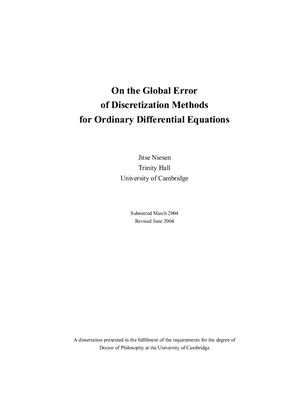University of Cambridge, 2004. - 118 pages.
Discretization methods for ordinary differential equations are usually not exact; they commit an error at every step of the algorithm. All these errors combine to form the global error, which is the error in the final result. The global error is the subject of this thesis. In the first half of the thesis, accurate a priori estimates of the global error are derived. Three different approaches are followed: to combine the effects of the errors committed at every step, to expand the global error in an asymptotic series in the step size, and to use the theory of modified equations. The last approach, which is often the most useful one, yields an estimate which is correct up to a
term of order h, where h denotes the step size and p the order of the numerical
method. This result is then applied to estimate the global error for the Airyequation (and related oscillators that obey the Liouville–Green approximation) and the Emden–Fowlerequation.
Discretization methods for ordinary differential equations are usually not exact; they commit an error at every step of the algorithm. All these errors combine to form the global error, which is the error in the final result. The global error is the subject of this thesis. In the first half of the thesis, accurate a priori estimates of the global error are derived. Three different approaches are followed: to combine the effects of the errors committed at every step, to expand the global error in an asymptotic series in the step size, and to use the theory of modified equations. The last approach, which is often the most useful one, yields an estimate which is correct up to a
term of order h, where h denotes the step size and p the order of the numerical
method. This result is then applied to estimate the global error for the Airyequation (and related oscillators that obey the Liouville–Green approximation) and the Emden–Fowlerequation.

